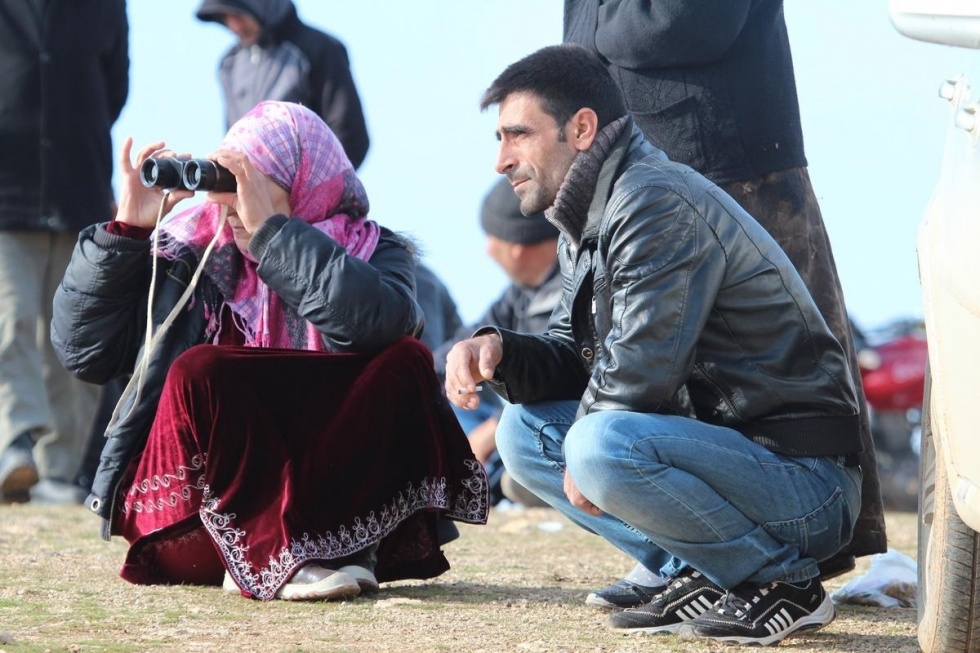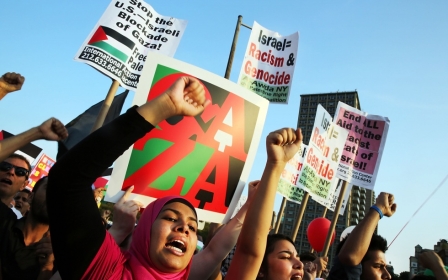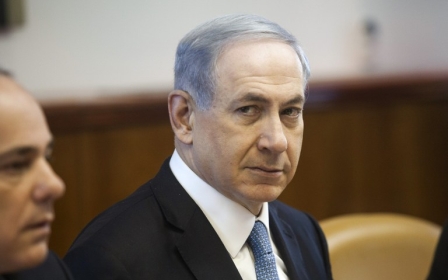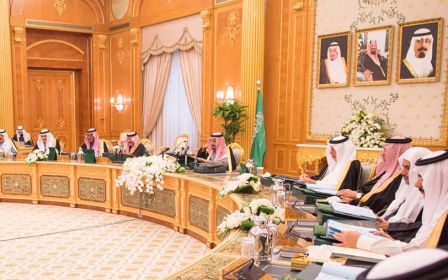Predictions: What will shape the Middle East in 2015?

Since Middle East Eye launched back in April, the region has been convulsed by change, most of it violent.
In North Africa, we have seen the security situation in Libya deteriorate even further, with the rival parliaments now openly, and often violently, jostling for control. We have also seen elections in Tunisia, Algeria and Egypt. Although the three all resulted in victories for politicians that have striven to present themselves as secular alternatives, the votes were conducted in very different circumstances, with the fate of the opposition - both liberal democratic and Muslim Brotherhood-linked - varying vastly from country to country.
The oil-rich Gulf, often seen as a bastion of stability in an otherwise conflict-prone region, has also gone through a string of changes. The once unshakable bond between the Gulf Cooperation Council (GCC) countries took an unprecedented turn for the worse when Saudi Arabia, Bahrain and the UAE withdrew their ambassadors from Qatar, reportedly over Doha’s backing for the Muslim Brotherhood in Egypt. While the GCC has since publically patched up its differences, tumbling world oil prices over the last few months of 2014 have potentially begun to threaten the Gulf’s long established system of generous benefit provision and low taxation.
Much of the world’s attention, however, has been focused on bloody events in Syria and Iraq where the rise of Islamic State (IS) and other militant groups has applied massive pressure on both Baghdad and Damascus and sparked a US-led military coalition against IS. So far, the coalition has had some minor success in pushing back the militant tide in Iraq, but various coalition partners have warned that victory – if there will ever be such a thing – is at least three to five years away. Nor have the air strikes managed to bring peace to Syria, where forces loyal to President Bashar al-Assad continue to battle various opposition forces, with 2014 bringing little reprieve to the nearly four-year-old conflict.
Gaza too has been ravaged by yet another war this summer, in which more than 2,100 Palestinians, mainly civilians, were killed. More than 70 people, mainly soldiers, were also killed on the Israeli side during the 50-day Israeli operation against Hamas that, despite hopes, failed to produce a lasting peace deal, with tensions remaining at fever pitch.
With the region still in flux and so many various developments happening from Mauritania to Iran, 2015 promises to be just as eventful. Here is a roundup of what the experts think we are likely to see in the next 12 months.
North Africa
Libya: Bad news and tough choices
Wolfgang Pusztai, Security & Policy Analyst
The situation in Libya will deteriorate further. The Salafi and jihadist influence will grow in the Libya Dawn Coalition. The more Islamic State is put under pressure in the Middle East, the more active it will be in Libya.
Egypt will prevent the establishment of a fundamentalist Islamic State on its eastern border by supporting the anti-Islamist coalition further - regardless who is in charge of it. As a measure of last resort, it could also intervene directly. Russia is also willing and likely to provide weapons maintenance and support.
But regardless of all the efforts, none of the warring factions will be able to win decisively. Militants will continue to use Libya for their purposes, while human traffickers will smuggle numerous illegal immigrants to Europe.
This leaves some tough choices for the West. It may do nothing or it could put real pressure for the parties to negotiate or possibly lead a Peace Support Operation to guarantee a ceasefire.
Libya’s winner will implode
Hassan Morajea, MEE Contributor based in Tripoli
This year saw Libya roughly divide between the forces of Libya Dignity - an alliance of tribes and army forces whose goal is to defeat political and extreme Islam in the country - and Libya Dawn which is a combination of tribal and Islamic parties.
Both now roughly control about 50 percent of Libyan territory and both think that they will emerge victorious. However, 2015 will likely prove that only one side will win the day. Unfortunately, rather than bring peace and stability, such a victory is likely to lead to further disintegration and violence as both camps are only made up of loose alliances, linked more by a common enemy than a true common goal or vision.
This means that the winning camp is likely to splinter, with former allies turning on each other and ensuring that Libya will see a fourth continuous year of division and war.
Egypt’s slide to dictatorship
Sharif Nashashibi, Journalist and Analyst focusing on the Middle East
The coming year is likely to see Egypt revert further into dictatorship, as the crackdown on dissent intensifies and widens, and the international community turns a blind eye to flagrant state abuses.
Upcoming parliamentary elections - facing similar limitations to the last presidential vote - look set to cement Abdel Fattah al-Sisi's hold on power. Opposition will remain deeply divided between supporters and opponents of his ousted predecessor, the Muslim Brotherhood’s Mohamed Morsi.
Meanwhile, Sisi faces no tangible international pressure to steer Egypt towards genuine democracy and respect for human rights - the ideals that led mass protests to topple Hosni Mubarak. Arab Gulf states will keep giving billions of dollars in financial aid, while Russia and the US vie for billions of dollars in military supplies.
The Gulf
The coming secession crisis
Kristian Coates Ulrichsen, Research Fellow at Rice University’s Baker Institute for Public Policy and an Affiliate Faculty at the University of Washington in Seattle.
Succession issues will likely take centre stage during 2015 in Oman and possibly also in Saudi Arabia and Kuwait. How these are resolved will tell us a lot about the ability of ruling families to maintain cohesiveness in the face of the greater societal assertiveness associated with the regional upheaval of the past four years.
While the period of public mobilisation has faded rapidly since the highpoint of the protest movements in 2011-12, falling oil prices and the growth of Islamic State mean that any change of leadership will take place against a volatile and uncertain regional backdrop. Although GCC governments have, for the most part, built up significant energy reserves that will see them through budget deficits in the short-term, this is not the case in Bahrain and Oman.
With internal and external threats to security intertwined as never before, 2015 may be the year when the ability of ruling elites to influence the pace and direction of change begins to falter, particularly if oil prices remain low for any extended time.
Fear for shale exporters, not Saudi Arabia
Nafeez Ahmed, investigative journalist, international security scholar and best-selling author
Low oil prices won't be a boon to the global economy as some are claiming, because their fundamental cause is a US-Saudi policy decision to glut the market as a mechanism of economic warfare against rivals like Russia, Iran and Venezuela, along with reduced demand as working people continue to cut back on spending as wages fail to keep up with inflation and risings costs.
The blowback effect that we might feel in 2015 is that the US, UK and European shale industries, which have high upstream costs (production), will face declining profit margins that will fundamentally endanger their business models. This increases the risk of nervous shareholders pulling out, and therefore of stranded assets. If the shale bubble bursts in the New Year, it could be similar to the subprime mortgage crash, and could indeed trigger collapses in other asset bubbles like housing.
Syria, Iraq and Islamic State
IS on the run
Sami Ramadani, Iraqi-born lecturer in sociology and an Iraq and Middle Eastern expert
In the Middle East, I predict major defeats for IS by Syrians and Iraqis. However, the US will continue to use the fight against IS and terrorism as a pretext for building the bases they long coveted in Iraq but couldn't have, because of strong popular opposition that forced the Maliki regime to refuse to give US forces immunity from prosecution in 2011.
Iraqi Kurdistan will become an even more important US military-political base in the area. The noticeable, but still manageable rift between Egypt and the US will widen, due to terrorism and Egyptian popular opposition to US and Israeli military actions and threats, particularly against Syria, Lebanon and Iran.
IS vs al-Qaeda - part II
Charlie Winter, Researcher at the Quilliam Foundation
Hostilities between al-Qaeda and Islamic State reached their ideological, if not practical, zenith in the last few months of 2014. Hence, it is seeming increasingly likely that the misleadingly termed "jihadist civil war" that many predicted in the wake of IS' declaration of the caliphate in June will play out over the next year.
In Syria, where al-Qaeda's affiliate Jabhat al-Nusra has recently made advances that brought it closer than ever to direct territorial and political competition with IS, this enmity will be most striking.
Further deterioration in relations between those in al-Qaeda’s camp and those in Baghdadi's is a certainty as IS continues in its efforts to eclipse its competition. Thus far at least, these initiatives have faced a host of political and theological obstacles and have been, at best, lacklustre. However, the longer that IS is able to keep hold of the territory it currently controls, the greater its chances at fulfilling its globalist aspirations.
IS spreads to Turkey
David Barchard, Turkey commentator and analyst
We are likely to see two big developments next year. Firstly the situation in the south-east with IS and the Kurds will get worse worse, while IS followers in Turkey may grow and we may see them stage a growing number of attacks.
Secondly, President Recep Tayyip Erdogan may get the authority in the general elections to set up his presidential system and tightens the screw against opponents.
Kurds lose out, again
Harvey Morris, journalist and commentator focusing on Kurdish affairs
If 2014 was the year in which world attention was drawn to Kurdistan, then this year is the one in which those wanting to know the end of the story are likely to be disappointed. In Iraqi Kurdistan none of the central issues - Kurdish independence, agreement on the status of Kirkuk, a permanent deal over oil-sharing between Baghdad and Erbil - are likely to be resolved.
The stalemate on all fronts will stem from the failure of Baghdad and its allies to oust IS from Mosul in an anticipated spring offensive. The success of that enterprise would rely in part on the support of trained and well-supplied Kurdish Peshmerga. The Kurdish leadership has said it is ready to help liberate non-Kurdish territory in Iraq, but a serious commitment is unlikely unless Erbil sees some guarantees for a long-term deal that reinforces its autonomy.
Without that, Kurds will show increasing disillusionment about the prospects of serving as foot soldiers in someone else's fight. The likelihood of further IS bombings in Iraqi Kurdistan - there was just one fatal attack in 2014 - will also influence Kurdish attitudes towards their Arab neighbours. Attacks would prompt fresh hostility to the presence of Arab refugees in Kurdish territory after anti-Arab protests in 2014 were repressed by the authorities.
Israel / Palestine
Possible annexation of the West Bank
Meron Rapaport, Israeli journalist and MEE columnist
In 2015, Israel may face a choice it has tried to avoid for so many years and be pushed to decide about the future of the West Bank and Gaza.
If Benjamin Netanyahu is re-elected Prime Minister in March, a pretty plausible possibility, he will be forced to depend more than ever on right-wing elements, above all the Jewish Home party. Its leader Naftali Bennett is predicted to be nominated Defence Minister in such a government. Contrary to Netanyahu who believes in keeping the status quo, Bennett is a man of change. The winds in his party - the most vibrant in the Israeli political scene right now - are blowing towards annexation of the West Bank or parts of it, which would create the basis for a one-state solution.
If Labor leader Isaac Hertzog, however, manages to win he will try to resume the talks with the Palestinians as soon as possible, but talks will prove difficult. The international community, including US President Barak Obama, has lost patience with endless negotiations and will probably set clear criteria to the talks such as the 1967 borders, as well as a strict timetable. Hertzog will have to choose between keeping his government together, or accepting these criteria. This does not mean that 2015 will be a year of peace, but rather that it might be a year of change.
Moribund peace process will remain on life support
Nadia Hijab, Executive Director Al-Shabaka: The Palestinian Policy Network
The next few months will be marked by the key players’ desperate efforts to keep the moribund peace process in place until the Israeli elections. Brain dead as this process is, the US and Europe, Israel, and the current Palestine Liberation Organization leadership all abhor a vacuum.
If a centrist coalition is elected in Israel we will see energetic moves to wrap up the Palestinian-Israeli conflict. You can be sure sovereignty won’t be on the cards for the truncated Palestinian state envisaged, or rights for Palestinian refugees. But Palestinian civil society at home and abroad will torpedo a bad deal. If Israel gets a far-right government its international standing will slide even faster as its racist acts become impossible to hide. Even a centrist coalition won’t be able to cover those up.
The Palestinian-led boycott, divestment and sanctions (BDS) movement will chalk up more victories. The EU will be forced to take stronger measures against Israeli settlements and racism. The first cracks, albeit paper-thin, will appear in the solid US Congress support for Israel because of the groundswell of activism among American Jews in particular and Americans more broadly in large part due to the repeated assaults on Gaza.
John Kerry throws in the towel
Chris Doyle, Director of Caabu
Palestine has had a tough 2014 but will probably face worse in 2015. Israeli political figures will campaign on who can bash the Palestinians the hardest platforms. Gaza may be hit frequently and regionally-backed attempts to replace Hamas which are likely to happen as unity plans fail. Tensions and violence in the West Bank will see more settlement building including movement forward on the E1 settlement project to the east of Jerusalem. The Palestinian Authority will lose much of its authority on the ground. Even John Kerry will give up shuttling between Jerusalem and Ramallah.
Gaza’s crisis will continue
Maher al-Taba’a, Gaza-based economist
There are two scenarios, but the more likely will see the blockade on Gaza continue and Gaza reconstruction delayed along with Palestinian reconciliation. This will leave the consensus government unable to administer the Gaza Strip. The second option is that the US will apply pressure on Israel to push through a deal, but this is unlikely.
Either way, Palestinian-Israel negotiations will face another hurdle as eyes will focus on the Israeli elections, which will change the discourse and make it so that Israel is no longer interested in finding a solution with Palestinians. This will keep the status quo as it is, regardless of who wins. I even expect Gaza‘s economy to get worse in 2015 and there will be no economic recovery as long as the blockade is in place which. The issue of public servant salaries will also not be resolved.
All this pressure inside Gaza may potentially create a new explosion and there are already indications that we may see a new war. As Israel did not commit to the ceasefire deal signed in August 2014, fresh violence may flare up in order to get out of the current bottleneck. But even another war will not solve the current crises, as long as there is no political will to do so.
Iran
Iran's not-so-secret, secret détente with America
Trita Parsi, founder and current president of the National Iranian American Council
In 2015, a nuclear deal will finally be struck between the P5+1 and Iran. Hopes for improved relations between the US and Iran will increase. But there will be no rapprochement between Tehran and Washington.
Obama will fight tooth and nail to save his nuclear deal from a Republican Congress, and the Iranians will officially maintain a distance to Washington, but behind the scene, dialogue will intensify. A new modus vivendi will be found between the two rivals, one in which their relationship is kept distant and cool on the surface, while the behind-the-scenes relationship will be characterised by greater proximity.
The common foes of IS, as well as general instability in the region will bring both sides significant strategic value if they intensify communication and coordination. But by keeping it semi-secret, both sides hope they will escape political backlashes at home - be it conservatives in Iran or Republicans and regional allies such as Israel and Saudi Arabia for the US. By and large, the new arrangement will work - the question is if it will prove durable.
The views expressed in this article belong to the author and do not necessarily reflect the editorial policy of Middle East Eye.
New MEE newsletter: Jerusalem Dispatch
Sign up to get the latest insights and analysis on Israel-Palestine, alongside Turkey Unpacked and other MEE newsletters
Middle East Eye delivers independent and unrivalled coverage and analysis of the Middle East, North Africa and beyond. To learn more about republishing this content and the associated fees, please fill out this form. More about MEE can be found here.




